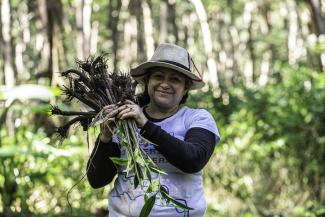OVERVIEW
The Regional Coastal Biodiversity Project reduces threats to biodiversity in bordering coastal marine communities in Honduras, Guatemala, and El Salvador by working towards climate-smart solutions for prosperous local livelihoods and the conservation of coastal marine biodiversity.
PRIORITIES
The Regional Coastal Biodiversity Project improves livelihoods through promotion of climate-smart biocommerce activities that reduce threats to biodiversity.
Activities increase the use of climate-smart landscape best management practices and target key opportunities to improve economic, social, and environmental sustainability. The project promotes an increase in scientific information and education to mitigate the impacts of climate change and helps strengthen governance and the regulatory framework for evidence-based biodiversity conservation.
Furthermore, through its activities, the project provides opportunities for communities to participate in the conservation, sustainable use, and decision-making of their coastal marine resources. The project’s cross-cutting gender, social inclusion, and communication strategies are aimed at providing education and awareness of best practices for changing behaviors.
The Regional Coastal Biodiversity Project is implemented by a consortium led by the IUCN (International Union for the Conservation of Nature), in association which GOAL, the Agency for the Development of the Moskitia (MOPAWI) in Honduras, the Association of Rescue and Conservation of Wildlife (ARCAS) and Defenders of Nature (FDN) in Guatemala, and the Salvadoran Ecological Unit (UNES) in El Salvador.

TOTAL INVESTMENT:
$13.4 million
TIME PERIOD:
Nov. 29, 2017– Nov. 28, 2024
PARTNERS:
IUCN
GOAL
Defenders of Nature (GT)
ARCAS (GT)
MOPAWI (HN)
UNES (SV)
GEOGRAPHIC AREA:
Motagua, La Moskitia, Rio Paz
